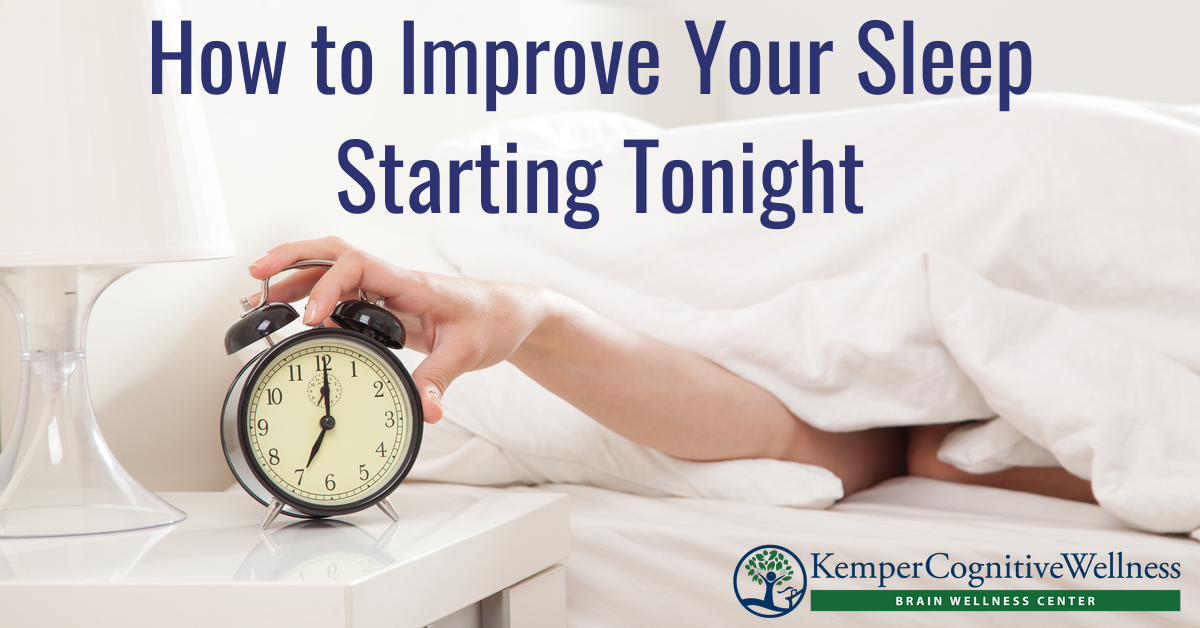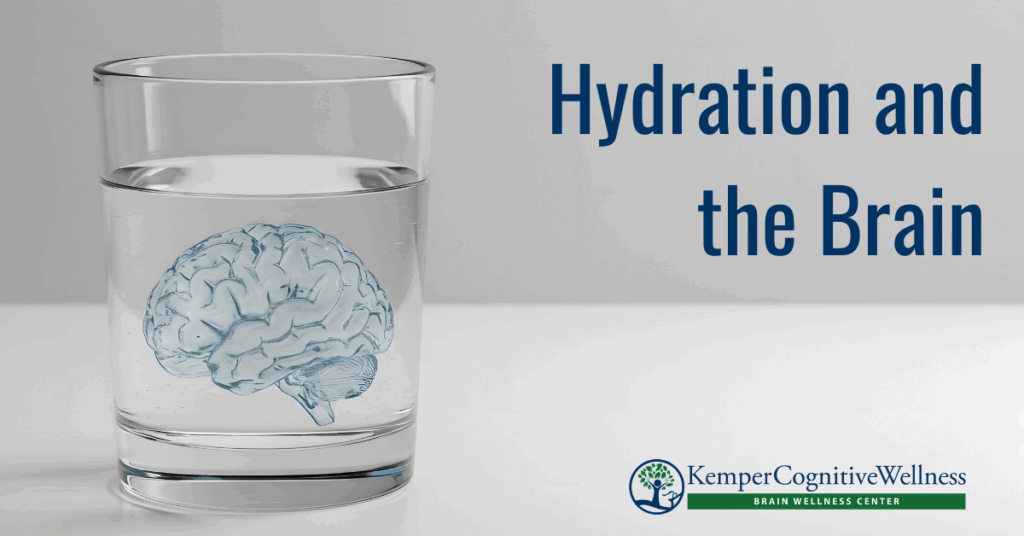By: Dr. Nate Bergman
It’s National Sleep Awareness Week, and while most of us know that poor sleep can lead to feelings of irritability and fatigue, many are still unaware of the extent to which poor quality or inadequate sleep can wreak havoc on our lives. What’s more, in the last few years, the science is showing that poor sleep can be an independent cause and contributor to developing Alzheimer’s and other kinds of dementia!
Yes, you read that right… good quality sleep is like a good washing machine for the brain (and, yes the opposite is true as well). Let’s look at the basics to getting high-quality, restorative sleep that will bring the wind back to your proverbial sails and help you – and your brain – function better.
When approaching an assessment of your own sleep, it’s helpful to consider these three areas:
- Duration
- Quality
- Timing
Duration
This one is often the most straightforward aspect of sleep but is difficult for some people to accept. The National Sleep Foundation suggests that most adults over age 18 get between 7-9 hours of sleep nightly (Source). A simple tool like a journal, Oura ring, or Apple Watch can really be helpful to raise awareness as to how much time you are spending in bed. Most people are cutting corners and trying to get by on 6-6.5 hours a night. They will typically suffer from mood problems, incomplete recovery, word/name finding difficulty, and “brain fog.”
Getting a full 8 hours allows your body to cycle all the way through the necessary steps of the sleep cycle (includes REM and Non-REM aspects of sleep) so that the brain and body wake up refreshed, detoxified, and ready to face the challenges of the next day. Inconsistent timing of sleep – for example, someone who gets 5-6 hours during the week and tries to “make up” for it on the weekend by getting 10 hours – is going to confuse their circadian rhythm and often falls short of the desired results of refreshing the brain and body because our sleep cycles thrive on consistency.
Quality
Sleep quality depends on two fundamentally important considerations
1.) Am I going through all the stages of Non-REM and REM sleep?
2.) Am I getting enough oxygen when I sleep?
Unfortunately, there isn’t a simple way to know if you are going through all the stages of sleep. A wearable device like an Oura ring suggests how you are doing with each stage of sleep – eg are you getting enough deep or REM sleep or is sleep getting disturbed so much that you can’t make it into those deeper, more healing stages of sleep. Ultimately, the most reliable way to get this information is by getting a sleep study, or a polysomnogram, in a sleep lab. In the United States, this has to be ordered by a healthcare provider and cleared with your insurance company prior to eligibility. So, estimations with apps or wearable devices can be a good place to start to answer the first question about sleep stages.
Oxygenation during sleep is a second issue of sleep quality and one of the main concerns here is a condition known as sleep apnea. We recommend taking the Epworth Sleepiness Scale to begin to understand your risk for this disorder.
If your score is higher than 10, you have excessive daytime sleepiness and should be talking to your healthcare provider about sleep apnea. Sleep apnea is very common in the US population, and even more common in adults over 50 years old.
The problem with sleep apnea is not “snoring” as most people assume, but it is a problem of low oxygen. Oxygen is like a healing elixir for your body, and when your brain doesn’t get enough at night, as is the case with sleep apnea, that means you are getting a small dose of brain damage EVERY night. Who wants to sign up for that!? Get checked out ASAP if you are at higher risk.
Timing
Know your “chronotype.” Generally speaking, there is an even distribution between 3 types of folks:
- Lions – these are the folks that wake up early – up and at ’em by 5 or 5:30 AM. If you get more done in the office by 9 AM than most people get done all day, you are probably a lion sleep chronotype. Do you struggle with productivity by the early afternoon? Do you typically feel “spent” by 8:30 or 9 PM? If so, for you exercise and coffee are best timed in the early morning or first half of the day. Lions typically have a normal or low-normal sleep drive, which translates to a need for about 7-8 hours of sleep to feel and perform their best.
- Night Owls – if you thrive at night when everyone else is going to bed, then you know you are a night owl. Our society tends to be a difficult one for owls to thrive within. Does your brain start to fire up and wake up later in the day? Perhaps you benefit from being a 2nd or 3rd shift employee and, where possible, wake up later than most other folks. You might be an owl if you benefit more so from exercise later in the day or in the evening. Often night owl chronotype folks can tolerate coffee later in the day. Owls typically perform their best on about 7-9 hours of sleep.
- Everyone Else – you are steady and consistent. You likely need a bit more sleep in the winter than in the summer when there are more daylight hours. You are probably someone who “needs my 8 hours or I’m grumpy!” And you’re not alone. The majority of people seem to fit into this genetically predisposed chronotype. The best thing you can do is honor that you will likely feel your best on 8-9 hours per night of sleep. Again, consistency is very important in this group.
What’s your chronotype? Still not sure? Take the quiz and find out.
So how are you sleeping?
Take the SATED Questionnaire and find out. This self-report questionnaire from the NIH assesses 5 key dimensions of sleep that have been consistently linked to health outcomes. The lower your score, the increased likelihood you suffer from poor sleep or sleep deprivation.
If your score is 7 or less, start taking active steps to remedy your sleep situation. When you do, you are likely to see multiple benefits, including increased energy, immune system function, mental clarity, sense of wellbeing.
Strategies to Improve Your Sleep Quality Quickly
Here are a couple of other basic strategies that might help improve your sleep quality rapidly:
- Sun before one (1 PM, that is). Getting natural light to hit our eyeballs before about 1 PM seems to activate genes that provide feedback to our circadian rhythm genes and send subtle genetic and epigenetic signals that trigger us to feel a sense of tiredness at a “normal” time for our bodies.
- No wine after nine (9 PM). More precisely, we want to avoid alcohol about 2-3 hours before bedtime. Alcohol in pretty much any form is “neurotoxic,” and a sleep-wrecker. Avoid alcohol before bedtime on a consistent basis.
- Well-timed snack. Sometimes people suffer from low blood sugar at night. Sometimes a complex carbohydrate with some protein (think celery stick with some peanut butter) can be a wonderful thing to stabilize blood sugar and avoid waking up at 2-3 with heart palpitations and nervousness.
If you have tried everything above, and your sleep is still devastated you may consider a nutritional evaluation, saliva cortisol test, brain map, or visiting a sleep specialist.





